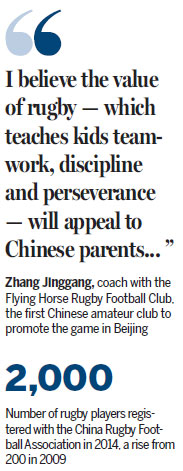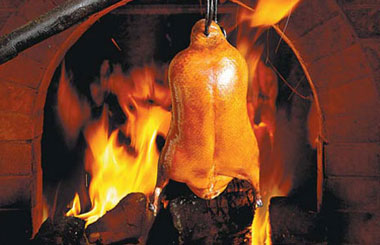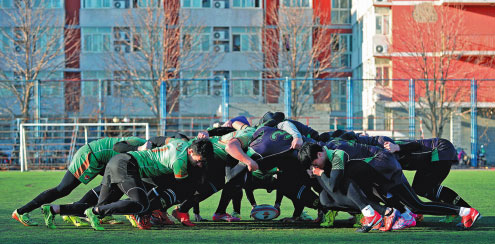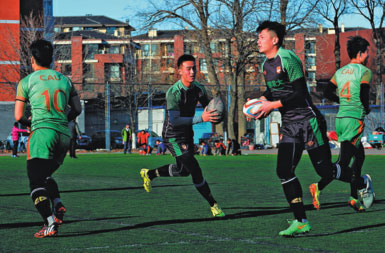Try, try and try again
Updated: 2016-01-22 08:12
By Sun Xiaochen(China Daily)
|
|||||||||||
Rugby union is slowly, but surely, gaining a foothold in China. Now, enthusiasts are determined to raise its profile and dispel common misconceptions by boosting the game's appeal to the younger generation. Sun Xiaochen reports.
Once just a popular pastime for expats, rugby union, especially the sevens version, has shaken off its niche status to gain wider acceptance among young Chinese participants and sports bodies.
Despite freezing weather and slight air pollution in Beijing on Saturday, the sight of about 20 children running with oval-shaped balls under their arms at a park in the capital's eastern downtown quickly attracted the attention of passers-by.
The children were participating in a two-hour training session as part of a promotion of youth rugby, albeit the less-physical version known as touch rugby.
The sessions started earlier this year by the Flying Horse Rugby Football Club - the first Chinese amateur club to promote the game in Beijing - were aimed at raising public awareness of the sport's educational value in contrast to its sometimes brutal appearance.
While the traditional format, played by teams of 15 per side, features physical contact and heavy tackling, touch rugby, in which players tag an opponent's body instead of tackling, is catching on with entry-level juniors.
Zhang Jinggang, a coach with Flying Horse, is confident that the game will eventually gain a foothold through grassroots participation, although it is nowhere near the sporting mainstream at present.
"Rugby has long been an instrumental part of education overseas, especially in countries such as Britain and Australia. I believe the value of rugby - which teaches kids teamwork, discipline and perseverance - will appeal to Chinese parents, who are beginning to care more about their children's overall development and not just academic excellence," said Zhang, who learned to play the sport in 1992 at the China Agriculture University in Beijing.
Recent setbacks
However, a recent setback at the national level has cast a shadow over the sport's growing popularity, and disappointed fans such as Zhang.
In November, both the Chinese men's and women's national sevens teams missed the opportunity to play in the 2016 Olympic Games in Rio de Janeiro by performing poorly in the Asian qualification tournaments, in which only the winners were awarded direct berths in the Rio Games.
For many Chinese enthusiasts, the defeat of the women's team hit hardest because the side had already cemented its status as the regional leader by claiming the sevens' title at the 2014 Asian Games.
Cui Weihong, secretary-general of the China Rugby Football Association, said the failure to make the Olympics was a huge blow to the fledging sport at national level.
"It's a big disappointment because we had so much confidence in, and expectation for, the women's team. We hoped its Olympic debut would bring more exposure to the sport, which has been hampered by a lack of funding outside the Olympic system in China for years," he said.
In a country where Olympic success weighs heavily on the assessment of sports officials, rugby sevens has been attracting growing attention from the General Administration of Sport of China, the country's top governing body for sports, since 2009, when members of the International Olympics Committee voted to include rugby in the Olympic program.
In 2013, to prompt funding and support from local sports authorities, rugby was included in the quadrennial Chinese National Games, and since 2010, two national championships - two-day sevens' tournaments held in different locations - have been held every year.
According to the CRFA, a record 12 men's and eight women's teams have been established by provincial sports bureaus to prepare for the National Games in 2017. However, while the number of players registered with the association rose from 200 in 2009 to about 2,000 in 2014, the number in England alone surpassed 340,000 in the same year, according to the International Rugby Board's annual report.
Promotion in schools
Insiders said the game's inclusion in the Olympics has inspired the governing bodies of sports in China to invest at the elite level, but strong grassroots promotion is the way forward, to encourage and involve more young people, and could lead to future prosperity.
"We have to try to change the stereotype that rugby is a dangerous game, which is not for everyone, by promoting the less-physical touch version on campuses and in communities," said Zhang Zhiqiang, a former captain of the Chinese men's national team.
Zhang was among the first group of homegrown rugby players. He learned to play the game in the 1990s, while studying at China Agriculture University in Beijing.
Rugby was introduced to China by Cao Xihuang, a professor at CAU, who had seen the game while on a visit to Japan. He decided to bring the game to China with the help of a Japanese colleague. The country's first rugby team was formed with 32 specially selected CAU students in December 1990.
Zhang, who now works as a physical education teacher and also coaches the CAU varsity team, said grabbing the attention of the younger generation will be the key to success: "The sport should return to where it started in China. There is no shortcut to becoming a world power without a solid youth foundation."
Zhang, who has overseas experience after playing for Sunny bank Rugby Football Club in Queensland, Australia, in the early years of the century, is fully aware of the importance of capturing the imaginations of children.
In July, along with his wife Jin Mengwei, the 41-year-old set up a youth camp, based at CAU, to offer students from nearby primary schools training in sevens rugby. Now, 24 students have signed up for the program, which sees them split into two classes that practice for 90 minutes a week under the guidance of the CAU's coaching crew.
Jin said some parents were so concerned that they even demanded the coaches shoot footage of full sessions to prove that rugby training wouldn't pose a physical risk to their children.
"The biggest challenge is the strong perception among parents and school principals generally that rugby is a dangerous game, even at the junior level, which features the safer touch version and uses protective gear," she added.
Youth participation
The promotion of youth rugby took off earlier in China's eastern coastal cities, such as Shanghai and Qingdao, Shandong province, where the influence of foreign cultures runs deeper, than in Beijing.
The Sharks Rugby Football Club in Qingdao has hired Daniel Wards, a youth rugby trainer from New Zealand, the game's global superpower, to coach juniors from 10 local schools where touch rugby has been introduced.
"They are really enthusiastic about the sport. For me, it's pretty easy to coach them because they want to learn new things all the time," said Wards, who visits different schools every day to coach students.
"This game (touch rugby) is great because everyone can play, including girls. It's quite simple (in terms of the rules) and without much physical challenge, so it's a great way to introduce rugby to the country."
Wang Xiaokun, director of the Qingdao Rugby Football Association, said the association has been organizing regional school tournaments since 2010, and now runs a 10-team amateur league.
To attract a growing number of student players, more than 10 universities in China, including CAU, Beijing Normal University and South China Agriculture University, have introduced majors in athletic training with rugby as a specialty.
Since 2013, the National University Rugby Sevens Championship has been organized annually, with last year's event attracting 12 male and eight female college teams from across the country.
"There's still a long way to go until the game is accepted as a great educational tool in China, but we won't give up pushing," Zhang said.
The CRFA's Cui Weihong said one of the priorities on the association's agenda this year is to organize regular training sessions for coaches and referees, with funding and technical support from the International Rugby Board.
Funded by the China Scholarship Council, 18 Chinese rugby coaches from across the country will fly to England, the birthplace of the game, in June for a three-month training program.
Professional dreams
Despite the game's improving profile in China, playing rugby as a semi-professional in the national system remains a labor of love, given that players earn much less than their millionaire counterparts in the country's top professional soccer and basketball leagues.
Players on provincial teams competing at the National Games earn an average 5,000 yuan ($760) a month, supplemented by a share of prize money - ranging from thousands to tens of thousands of yuan - if they win the title.
Even if they are recruited by the national team, players only receive a monthly training allowance of 600 yuan.
To put it into perspective, the sum pales into insignificance when compared with the salary of Jonny Wilkinson, a retired English rugby star and World Cup winner, who was paid $61,000 a month when he played for Toulon, the French Top 14 club, in the 2013-14 season.
Without a national league, the lack of consistent exposure in the years between the National Games has hampered the sport's appeal to sponsors and investors in China.
"The biggest problem is that we don't have enough games to play. If people can't see us play on a regular basis throughout the year, how can we promote the sport?" Xu Fangjie, coach of the Liaoning provincial men's team, asked.
Last year, to help the game gain consistent exposure, the CRFA divided the annual Sevens National Championships into four legs held in different cities, and will also host the Asian Sevens Series in October.
"The sevens' action will keep going from April to November with a series of scheduled events. We hope this intensive exposure will attract interest from sponsors and sports marketing agencies to help establish a professional league in the near future," Cui said.
Contact the writer at sunxiaochen@chinadaily.com.cn



|
Members of the China Agriculture University rugby team are during a regular training on campus in Beijing on Dec 10. Photos by Wei Xiaohao / China Daily |
|
The CAU team was one of the first rugby teams set up on the Chinese mainland. |
(China Daily 01/22/2016 page6)
Today's Top News
China gives beleaguered Tsipras a helping hand
China and Gulf nations resume free trade talks
IMF starts to select new chief
Merkel insists on European solution for refugee crisis
China, Saudi Arabia sign deals on Xi's visit
Hollande announces $2.2b plan to create jobs
Chinese conductor becomes first woman in charge of BBC orchestra
Taxi drivers in Budapest protests against Uber
Hot Topics
Lunar probe , China growth forecasts, Emission rules get tougher, China seen through 'colored lens', International board,
Editor's Picks

|

|

|

|

|

|








